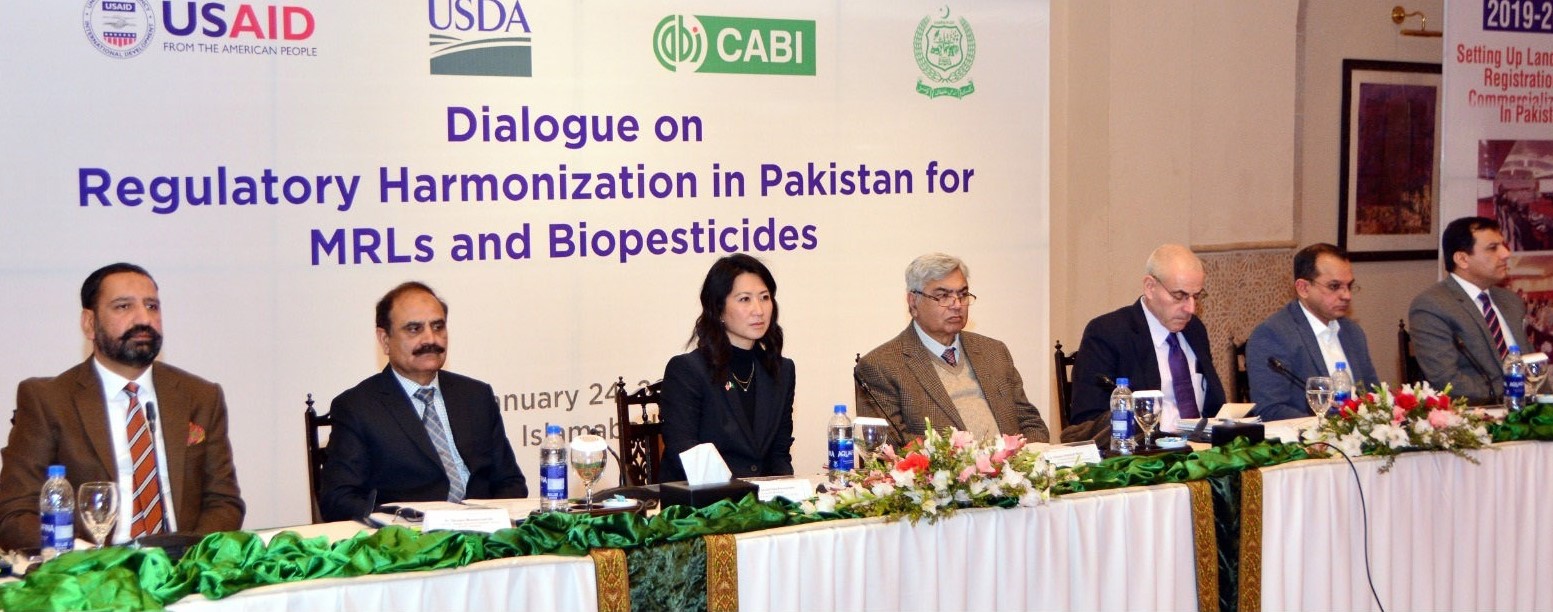- USDA-CABI-PARC ORGANIZE REGULATORY HARMONIZATION DIALOGUE ON MAXIMUM RESIDUAL LIMITS AND BIO-PESTICIDES
WNAM report: A significant dialogue on regulatory harmonization in Pakistan for Maximum Residue Levels (MRLs) and Bio-pesticides was held, aiming to improve food safety standards in the country. The event brought together four major partners, United States Department of Agriculture (USDA), Centre for Agriculture and Bioscience International (CABI), Pakistan Agricultural Research Council (PARC), and representatives from the private sector specially Rafhan Maize Product Co. Ltd. The primary focus of the dialogue was to facilitate the availability and regulation for Aflatoxin biological control technology for maize, which had demonstrated promising results in field trials.
Addressing the dialogue, Dr. Kauser Abdulla Malik, the esteemed chief guest, emphasized the significance of aflatoxin control in enhancing Pakistan’s agricultural exports. He commended the collaborative efforts of CABI, USDA and PARC in this domain, recognizing their dedication to ensuring food safety. Dr. Kauser further highlighted the importance of exploring innovative techniques to minimize the reliance on nitro-based fertilizers, alongside promoting the use of organic fertilizers, in response to the challenges posed by climate change. He acknowledged the Ministry’s development of the National Agricultural Biotechnology Policy and extended his appreciation to PARC, USDA, CABI, and the private sector for their instrumental contributions to the success of the dialogue. He also acknowledged the active participation of media personnel, recognizing their valuable engagement in disseminating information related to this crucial topic.
In his concluding remarks, Dr. Ghulam Muhammad Ali, Chairman, Pakistan Agricultural Research Council (PARC), emphasized the significance of Aflatoxin Control in both bolstering export potential and safeguarding the nation’s public health. He underscored the ongoing efforts of PARC scientists in developing biological control methods for Aflatoxin in various crops such as Chillies, Maize, Rice, and Ground nuts. Furthermore, Dr. Ali expressed the intention to present forthcoming policies pertaining to Biotechnology and seed certification. He extended his gratitude to all partners involved, the esteemed Minister, and media personnel for consistently highlighting the endeavors of agricultural scientists.
Ms. Jessica Mudjitaba-Fernandez, Program Manager, USDA, stated that Collaboration is crucial in tackling the challenges posed by Aflatoxin contamination. She emphasized that by working together, USDA, CABI, PARC, and the private sector can pool their expertise and resources to develop effective strategies for Aflatoxin control, ensuring the safety and quality of agricultural products in Pakistan. Mr. Keith Metzner, USAID, acknowledged the longstanding cooperation between Pakistan and the United States in the agricultural sector, which has resulted in notable achievements, particularly in the cultivation of wheat and maize. He emphasized the significance of enhancing food safety mechanisms as a means to boost agricultural exports from Pakistan.
Mr. Babar Ehsan Bajwa, CABI’s Senior Regional Director, Asia expressed his gratitude to all participants for their active engagement in the dialogue and their genuine interest in the national cause of ensuring food safety and implementing Biological control measures for Aflatoxin. In his remarks, Dr. Bajwa acknowledged the significance of their collective efforts in addressing this critical issue and emphasized the importance of continued collaboration and knowledge sharing to achieve sustainable solutions in the realm of Aflatoxin control.


